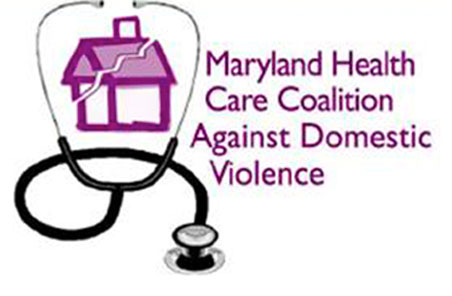Safe and healthy babies start with safe and healthy pregnancies!
Being free of violence and fear can help you have a safe and healthy pregnancy. Help is available.
- Learn how to talk with your health care provider, HERE.
- The list of comprehensive domestic violence programs in Maryland can be located HERE
- The list of hospital-based domestic violence programs in Maryland can be located HERE
- The National Domestic Violence Hotline (24/7 toll-free support) is 1-800-799-SAFE (1-800-799-7233) TTY 1-800-787-3224
- For additional mental health resources, check-out NAMI and MHA
- Contact 211, a free, confidential service to connect with local human and social services and resources.
- Contact your local comprehensive domestic violence agency for more resources on programs like WIC, SNAP, rental assistance, etc.
Abuse is common and can begin or increase during pregnancy and after delivery. Are you and your baby safe?
Has your partner ever:
- Hit, kicked, strangled (choked), or otherwise hurt or threatened you?
- Tried to harm your pregnancy by hitting, kicking, or pushing your stomach?
- Threatened to try to end your pregnancy?
- Blamed you for being pregnant?
- Demanded that you get an abortion?
- Called you names? Insulted you?
- Threatened to kill you or your baby if you leave?
- Threatened to take your baby after birth?
- Tried to control how you care for yourself and your baby?
- Forced you to get pregnant when you didnt want to?
- Refused to use a condom or other contraception when you asked them to?
- Led you to believe they were using contraception when they were not?
- Coerced you, threatened you, and/or used physical violence to keep you from using contraception?
- Tampered with your form of contraception?
- Kept you from seeing a health care provider or seeking medical treatment?
- Tried to keep you from seeing your family and friends?
- Taken your phone?
- Constantly called or texted to see where you were?
- Blamed you for problems with the relationship?
- Accused you of cheating?
- Questioned the paternity of your baby?
- Destroyed your things?
- Hurt or killed your pets?
- Kept you from getting a job or accessing money?
- Tried to sabotage your employment?
- Made you feel like you had to walk on eggshells?
- Done other things that make you feel afraid?
The Myths
- “I’m not abused – my partner never hit me.”
- “We’re in a relationship, so I can’t to say ‘no’ to sex with my partner.”
- “I’ll be safer while I’m pregnant.”
- “My partner changed so much after I got pregnant. I must be doing something wrong.”
- “Things will settle down once the baby comes.”
- “My kids don’t know about the abuse, and it doesn’t seem to affect them.”
- “I’m not ready to leave my partner, so hotlines and domestic violence shelters can’t help me.”
Individual experience and research shows that these assumptions are rarely true.
Abuse can be verbal, emotional, economic, psychological, or sexual and often escalates during and after pregnancy. Many people feel as though they have done something to cause the abuse, but no one deserves to be mistreated. Maryland law recognizes that consent is required in all sexual relationships, including marriage. No one, regardless of their relationship status, has the right to force or coerce their partner into sexual activity. Children who grow up with domestic violence often develop physical and/or emotional problems, even if they never directly witness the violence or abuse. Many domestic violence programs offer lots of different services even if you decide to stay in the relationship.
Have you experienced reproductive coercion?
Reproductive coercion can take the form of any situation in which one partner is exerting power over another through manipulation, force, or threats in a way that impacts their reproductive health.
Has your partner ever:
- Forced you to get pregnant when you didn’t want to?
- Refused to use a condom or other contraception when you asked them to?
- Led you to believe they were using contraception when they were not?
- Coerced you, threatened you, and/or used physical violence to keep you from using contraception?
- Tampered with your form of contraception? (This is known as birth control sabotage.)
- Restricted you from seeing a health care provider or receiving care for your sexual and reproductive health?
The Facts About Abuse During Pregnancy
Abuse can be physical, verbal, emotional, economic, psychological, or sexual.
- Intimate partner violence (IPV) affects millions of people regardless of age, socioeconomic status, race, religion, ethnicity, sexual orientation, or educational background.
- Individuals subjected to IPV may have lifelong health consequences. 1 in 3 women globally experiences violence in her lifetime. Many individuals who are pregnant report that abuse began or got worse during pregnancy.
- Abuse is four times more likely to occur if the pregnancy is unwanted.
- Children born to abused mothers are 17% more likely to be born underweight and more than 30% more likely than other children to require intensive care upon birth.
- Homicide is a leading cause of death amongst pregnant Marylanders.
- Individuals who are subjected to IPV may have lifelong consequences, including emotional trauma, lasting physical impairment, chronic health problems, and even death.
Abuse during pregnancy can lead to medical complications, including life-threatening ones.
If you experience physical, emotional, and/or sexual abuse while you are pregnant, you have a higher risk of:
- Preterm labor
- Miscarriage or stillbirth
- Injury to your uterus
- Sexually transmitted infections
- Depression, anxiety or post-traumatic stress disorder (PTSD), during pregnancy and postpartum
- Bleeding during pregnancy
- High blood pressure
- Anemia
- Difficulty eating a healthy diet or getting adequate sleep
- Tobacco, alcohol, and drug use
- Vaginal bleeding
- Death
Maternal Mortality and Morbidity
Pregnant and birthing people in the United States are more than two times as likely to die from pregnancy and childbirth-related complications than those in most other high-income countries in the world. Examples of complications include:
- High blood pressure during pregnancy (pre-eclampsia and eclampsia)
- Severe bleeding (mostly bleeding after childbirth)
- Infections (usually after childbirth)
- Complications from delivery and unsafe abortion
Abuse from a partner can exacerbate these complications and can cause death.
Racial Disparities Exist
Black women in the United States experience unacceptably poor maternal health outcomes. In fact, Black women are three times more likely to die from pregnancy or childbirth than women of any other race. Abuse from a partner can exacerbate these issues. Some of the contributing factors may include:
- A higher risk for developing high blood pressure and fibroids during pregnancy
- Higher rates of postpartum heart issues and other serious medical conditions
- Less access to medical equity and quality care
- Experiencing bias and racism when receiving medical care
Abuse also increases your baby’s risk of:
- Low birth weight
- Preterm delivery
- Injuries, infections, and other health problems
- Difficulty sleeping and feeding
- Difficulty being calmed or comforted
- Difficulty learning to walk and talk
- Difficulty attaching to caregivers
- Physical or sexual abuse
- Depression, anxiety, and behavior problems
- Death
Talk with your healthcare provider. Medical visits are an opportunity to reach out for support.
To download the shortened “Safe & Healthy Babies Start with Safe & Healthy Pregnancies,” material, click here .
To download the shortened “Safe & Healthy Babies Start with Safe & Healthy Pregnancies,” material, specific to Charles County, click here.
_______________
References:
ACOG Intimate Partner Violence: Committee Opinion; Number 518: February 2012 (Reaffirmed 2022) Committee on Health Care for Underserved Women. https://www.acog.org/clinical/clinical-guidance/committee-opinion/articles/2012/02/intimate-partner-violence
MacDorman, M. F., Thoma, M., Declcerq, E., & Howell, E. A. (2021). Racial and Ethnic Disparities in Maternal Mortality in the United States Using Enhanced Vital Records, 2016‒2017. American Journal of Public Health, 111(9), e1–e9. https://doi.org/10.2105/ajph.2021.306375
Silverman, JG, Decker, MR, Reed, E, Raj, A. Intimate Partner Violence Victimization Prior to and During Pregnancy Among Women Residing in 26 U.S. States: Associations with Maternal and Neonatal Health. American Journal of Obstetrics and Gynecology 2006; 195(1): 140-148.
Racial disparities in maternal health: Harnessing Data for the health of America. (2021). Blue Cross Blue Shield, The Health of America Report. https://www.bcbs.com/sites/default/files/file-attachments/health-of-america-report/BCBSA-HOA-Maternal_Health_Dispairities.pdf
U.S. Commission on Civil Rights: Racial disparities in maternal health. (2021). U.S. Commission on Civil Rights: 2021 Statutory Enforcement Report. https://www.usccr.gov/files/2021/09-15-Racial-Disparities-in-Maternal-Health.pdf
World Health Organization. (2023, February 22). Maternal Mortality. Who.int; World Health Organization: WHO. https://www.who.int/news-room/fact-sheets/detail/maternal-mortality





